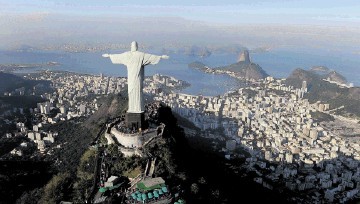
Brazil’s acting president has held his first official Cabinet meeting after vowing the new team will try to rescue the country’s plunging economy at a moment of profound political confrontation.
The gathering at the government headquarters followed a chaotic day that saw the Senate vote to impeach President Dilma Rousseff, suspending her from office and abruptly ousting nearly her entire government – a move she branded “a coup”.
Michel Temer moved quickly to announce his new team, whose star appears to be Finance Minister Henrique Meirelles, widely respected for serving as Central Bank chief during the boom years from 2003 to 2010.
Mr Meirelles promised to tackle reforms to the pension system, saying “retirement must be self-sustaining over time”, and vowed to change labour laws to increase productivity.
At a swearing-in ceremony for his 22 Cabinet ministers, Mr Temer said: “Our biggest challenge is to staunch the process of freefall of our economy.
“First of all, we need to balance our public spending. The sooner we are able to balance our books, the sooner we’ll be able to restart growth.”
He also promised to support the widening investigation into corruption at the state oil company that has already ensnared leading politicians from a variety of parties and even implicated Mr Temer himself – as well as several members of the new Cabinet.
His choice of ministers also raised criticism for its make-up: All its members are middle-aged or elderly white men – a particularly sore point in this majority non-white country.
Six women, including one black, were among the 39 members of Ms Rousseff’s Cabinet when she began her second term last year.
Mr Temer made a bid for peace with Ms Rousseff, offering his “institutional respect” for the suspended leader, who continues to live in the presidential residence even as her replacement holds down the government offices.
“This is not a moment for celebrations, but one of profound reflection,” he said.
“It’s urgent to pacify the nation and unify the country. It’s urgent for us to form a government of national salvation to pull this country out of the serious crisis in which we find ourselves.”
Ms Rousseff, however, vowed to fight her ouster, calling it “a coup” led by a social and economic elite that had been alarmed by the policies of her leftist Workers’ Party, which had held power for 13 years.
She warned that Mr Temer plans to dismantle government social programmes that benefit around one-fourth of the Brazilian population.
He insisted the programmes would be maintained and “perfected” under his leadership.
However, his choice to lead the Social Development Ministry, Osmar Terra, acknowledged that could be tough.
Mr Terra said: “What President Michel is proposing is that those programmes be the most sheltered (from cuts). But if the budget hole is very big, we’ll see. The country is bankrupt.”
Ms Rousseff, whose popularity plummeted amid the worst recession since the 1930s, is accused of using illegal accounting tricks to hide large deficits in the federal budget.
Opponents argue that damaged the country, but Brazil’s first female president called it a baseless pretext by the elite to snatch back power.
The economy has been predicted to contract nearly 4% this year after an equally dismal 2015, and inflation and unemployment are hovering around 10%, underscoring a sharp decline after the South American giant enjoyed stellar growth for more than a decade.
Ms Rousseff will be suspended for as long as 180 days pending a trial in the Senate. If two-thirds of the 81 senators vote to find her guilty, Mr Temer would serve out the remainder of her term, which ends in December 2018.
Mr Temer, the long-time leader of the centrist Democratic Movement Party, had been Ms Rousseff’s vice president as part of a coalition of convenience that broke down under the strains of economic woes and corruption scandals.
He is known less for a specific ideological stance than for his skills at backroom deal-making.
The scandal at oil company Petrobras revealed deep-seated corruption that cuts across the political spectrum in Brazil and has entangled top officials from the Workers’ Party and the opposition alike as well as top businessmen.
Mr Temer has been implicated by witnesses in the scandal, but he has not been charged.
The impeachment drive’s main motor, former House Speaker Eduardo Cunha, has been charged in the scandal and was suspended last week as speaker over allegations of corruption and interfering
with justice.
Several of Mr Temer’s Cabinet appointees have also been hit with corruption charges and other allegations.
The acting president pledged that the investigation will continue unimpeded.
“It deserves to be followed closely and protection against any interference that could weaken it,” he said.
Recommended for you
